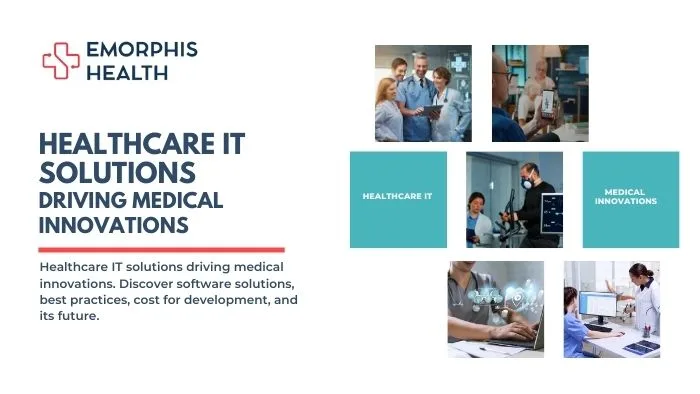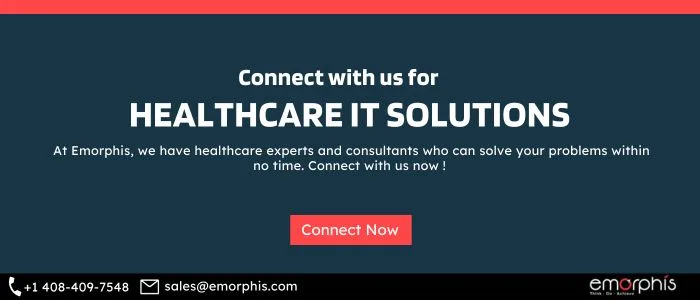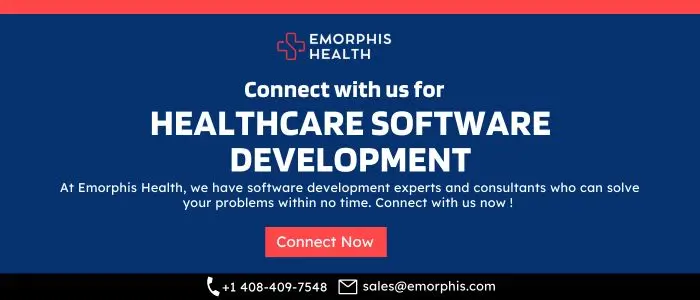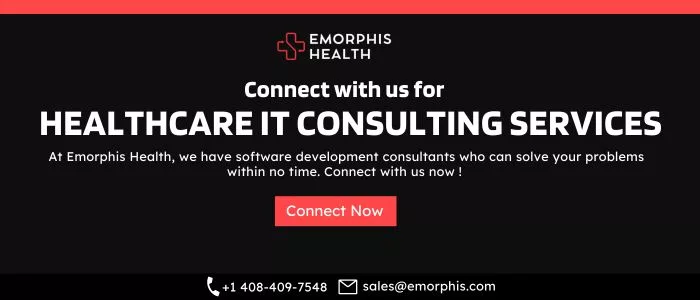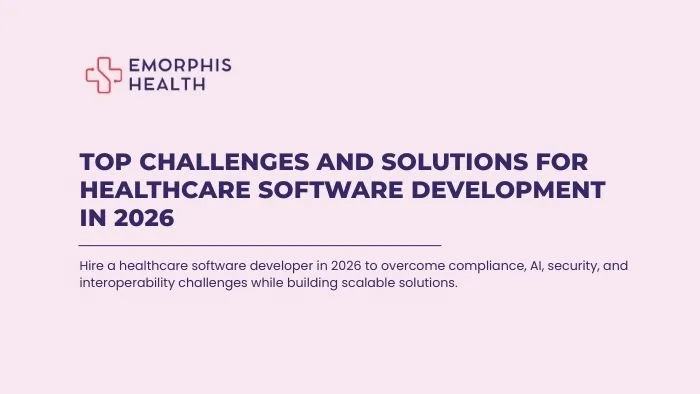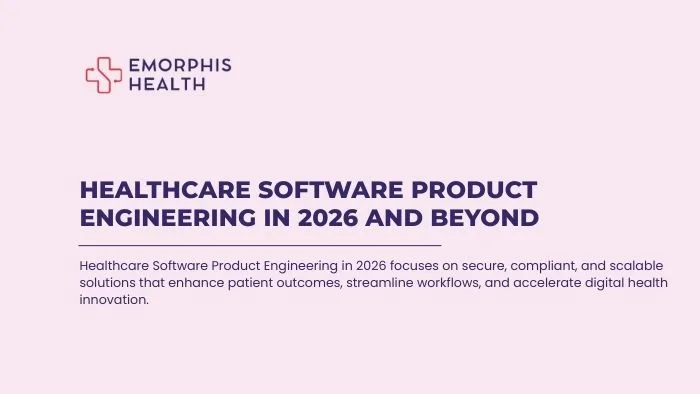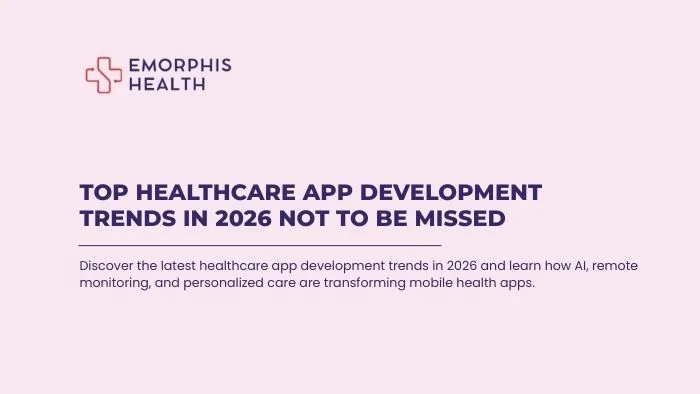Overview
See Contents
The role of Healthcare IT solutions in propelling medical innovations has emerged as a cornerstone for transformative change. According to Mordor Intelligence, the healthcare IT solutions market worldwide is anticipated to achieve a value of USD 311.09 billion in 2023 and is expected to exhibit a compound annual growth rate (CAGR) of 15.24%, reaching USD 632.27 billion by 2028. The convergence of cutting-edge technologies and data-driven strategies is reshaping how healthcare is delivered, paving the way for unprecedented advancements in patient care, diagnostics, and overall operational efficiency.
From the seamless integration of electronic health records to the revolutionary impact of artificial intelligence on diagnostics and treatment planning, these IT solutions are driving a paradigm shift in the medical field. This symbiosis of healthcare and technology not only enhances the accuracy and speed of clinical decision-making but also fosters a patient-centric approach, ultimately steering the healthcare industry toward a future marked by innovation, accessibility, and improved health outcomes.
What are the various healthcare IT solutions driving medical innovations?
In the realm of medical innovations, diverse Healthcare IT solutions are serving as catalysts for transformative change. The integration of electronic health records facilitates streamlined information management, offering healthcare professionals comprehensive insights into patient histories and treatment plans.
Telehealth platforms and virtual care solutions are redefining patient-provider interactions, allowing for remote consultations and continuous monitoring. Advanced analytics and artificial intelligence contribute to data-driven decision-making, revolutionizing diagnostics, predictive modeling, and personalized treatment approaches.
Interoperability frameworks foster seamless communication between disparate healthcare systems, enhancing care coordination and information exchange. Furthermore, the rise of wearable devices and the Internet of Things (IoT) is enabling real-time health monitoring, empowering individuals to actively engage in their well-being. This amalgamation of healthcare IT solutions is propelling medical innovations, marking a shift towards more efficient, accessible, and patient-centric healthcare ecosystems.
Let us look at some of the well-known healthcare IT solutions.
Popular Healthcare IT Solutions
1. EHR and EMR Systems
Healthcare IT solutions, like EMR and EHR systems, revolutionize patient data management by digitizing health records. Epic Systems and Cerner lead the industry, providing comprehensive platforms that empower healthcare providers with instant access to patient information, treatment history, and medication records. These solutions not only enhance patient care but also improve overall operational efficiency within medical facilities. Healthcare IT consulting services play a crucial role in guiding organizations through the integration of these systems, ensuring seamless adoption and optimization.
2. Practice Management Software
Practice management software, including Kareo and NextGen Healthcare, serves as the backbone of healthcare administration, covering appointment scheduling, billing, and administrative tasks. These solutions optimize practice workflows, leading to improved patient experiences and increased revenue. Healthcare IT software companies specializing in practice management collaborate with healthcare IT consulting services to tailor solutions to the unique needs of each medical practice, fostering efficient and streamlined operations.
3. Telehealth and Telemedicine Platforms
Telehealth solutions, such as Doxy dot me and Teladoc, leverage technology to break down geographical barriers in healthcare delivery. These platforms enable remote consultations, making healthcare accessible to patients regardless of location. With the rise of virtual healthcare, healthcare IT consulting services assist in the seamless integration of telehealth platforms, ensuring secure and effective virtual care delivery.
Find details of Telemedicine App Development Solutions
4. Health Information Exchange (HIE) Platforms
HIE platforms, represented by Redox and Carequality, facilitate the secure sharing of patient information among healthcare providers and systems. These Health Information Exchange solutions improve care coordination and enhance patient outcomes by ensuring that critical health data is available where and when it’s needed. Healthcare IT consulting services guide organizations in navigating the complexities of data exchange standards, ensuring interoperability and compliance with regulatory requirements.
5. Medical Imaging Software
Medical imaging software, such as Merge Healthcare and Agfa HealthCare, transforms the landscape of diagnostic imaging. These solutions facilitate the storage, retrieval, and analysis of medical images, contributing to accurate and timely diagnoses. Collaboration with healthcare IT software companies ensures that medical imaging systems seamlessly integrate with existing healthcare IT infrastructure, providing diagnostic accuracy and improving patient care. 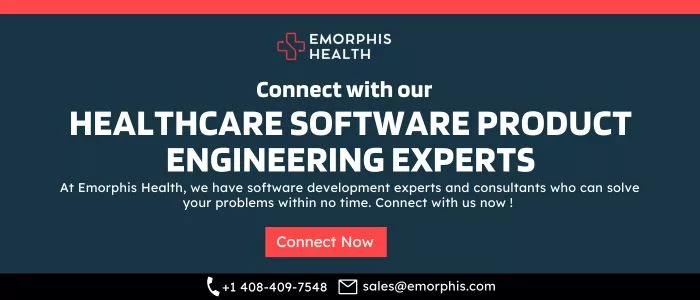
6. Clinical Decision Support Systems
Clinical Decision Support Systems, like IBM Watson Health and Zynx Health, empower healthcare professionals with data-driven insights at the point of care. These solutions enhance diagnostic accuracy and treatment planning by providing evidence-based information and best practices. Healthcare IT consulting services guide healthcare organizations in the effective implementation and customization of these systems, ensuring their alignment with clinical workflows.
7. Revenue Cycle Management (RCM) Software
RCM software solutions, exemplified by Waystar and athenaCollector, streamline financial processes within healthcare organizations. These Revenue Cycle Management Software Development solutions optimize billing, coding, and reimbursement, minimizing revenue leakage and improving overall financial health. Engaging healthcare IT consulting services is essential to navigating the complexities of healthcare billing and coding, ensuring accurate and timely revenue cycle management.
8. Healthcare Analytics and Business Intelligence
Healthcare Analytics Software and business intelligence tools, including Health Catalyst and Tableau Healthcare, harness the power of data to drive strategic decision-making. These solutions enable healthcare organizations to derive actionable insights, improve operational efficiency, and enhance patient outcomes. Collaborating with healthcare IT consulting services ensures the effective implementation and utilization of analytics solutions, aligning data-driven strategies with organizational goals.
9. Population Health Management
Population health management solutions, led by companies like Arcadia and Evolent Health, focus on improving the health of specific patient populations. These solutions leverage data analytics and care coordination to enhance preventive care, reducing overall healthcare costs. Healthcare IT consulting services guide organizations in adopting and optimizing population health management strategies, tailoring interventions to the unique needs of diverse patient groups.
10. Patient Engagement Solutions
Patient engagement solutions, including GetWellNetwork and PatientPop, redefine the patient-provider relationship by leveraging technology for active patient involvement. These solutions enhance communication, education, and collaboration, fostering a more patient-centric approach to healthcare. Collaborating with healthcare IT consulting services ensures that patient engagement solutions are effectively implemented and integrated, contributing to improved patient satisfaction and outcomes.
11. Healthcare Interoperability Solutions
Interoperability solutions, such as Infor Cloverleaf and Redox, play a crucial role in creating a seamless healthcare ecosystem by enabling the exchange of data between disparate systems. These Healthcare Interoperability solutions enhance communication and coordination across healthcare entities, improving overall patient care. Healthcare IT consulting services guide organizations in implementing interoperability solutions, ensuring compatibility and connectivity among diverse healthcare platforms.
12. Remote Patient Monitoring
Remote patient monitoring solutions, including Philips Healthcare and Vivify Health, empower healthcare providers to monitor patients’ health remotely. These Remote Patient Monitoring App Development solutions are particularly valuable for chronic disease management, allowing for proactive interventions and personalized care plans. Healthcare IT consulting services assist organizations in deploying and integrating remote patient monitoring solutions, ensuring optimal patient outcomes and increased efficiency in healthcare delivery.
Find out more details on Remote Patient Monitoring Software Development
13. Healthcare CRM
Healthcare CRM solutions, such as Salesforce Health Cloud and Microsoft Dynamics 365 for Healthcare, focus on strengthening relationships between healthcare providers and patients. These solutions streamline communication and enhance patient engagement, ultimately improving overall care quality. Engaging healthcare IT consulting services is crucial for organizations to effectively implement and customize CRM solutions, tailoring them to specific patient relationship management needs.
14. Pharmacy Management Software
Pharmacy management software, represented by McKesson Pharmacy Systems and Epic Willow, streamlines operations within pharmacy settings. These solutions cover inventory management, prescription processing, and regulatory compliance, optimizing pharmacy efficiency. Healthcare IT consulting services guide organizations in implementing and integrating pharmacy management software, ensuring compliance with pharmaceutical regulations, and improving overall pharmacy services.
15. Laboratory Information Management Systems (LIMS)
Laboratory Information Management Systems, such as STARLIMS and LabWare LIMS, automate and manage laboratory workflows and data. These solutions enhance the accuracy and efficiency of laboratory processes, contributing to reliable results and research outcomes. Collaborating with healthcare IT consulting services supports organizations in implementing and customizing LIMS, ensuring that the systems align with specific laboratory requirements, promoting quality diagnostics, and advancing medical research.
16. Care Management Software Solutions
Care management software solutions, exemplified by Casenet TruCare and Medecision Aerial Care Management, focus on coordinating and optimizing patient care across various healthcare settings. These solutions facilitate care planning, collaboration among healthcare providers, and patient engagement, ultimately improving health outcomes. Engaging healthcare IT consulting services is instrumental in implementing and customizing care management software, ensuring seamless integration with existing healthcare IT infrastructure, and aligning with the organization’s care delivery goals.
Best Practices for Implementing Healthcare IT Solutions
Harnessing the power of healthcare IT is crucial for modern healthcare providers. However, navigating the landscape of solutions and ensuring successful implementation can be daunting. Find the following best practices for healthcare IT solutions implementation:
- Start with Clarity: Identify Needs: Before diving in, partner with experienced healthcare IT consulting services to analyze your specific needs and challenges. Are you looking for medical IT solutions to optimize scheduling, streamline billing, or enhance patient engagement? Defining your goals ensures efficient solution selection.
- Choose Wisely: Prioritize Interoperability: Don’t get siloed! Invest in healthcare IT software that seamlessly integrates with existing systems. Look for vendors who prioritize open standards and data exchange capabilities.
- User-Centric Focus: Emphasize Usability: Remember, your software is for your staff and patients. Opt for healthcare IT software companies that offer intuitive interfaces and comprehensive training programs. User adoption is key to success.
- Data Drives Progress: Embrace Data Security: Healthcare data is sensitive—partner with healthcare IT solutions providers who prioritize robust security measures and HIPAA compliance.
- Continuous Improvement: Monitor and Adapt: Don’t set-and-forget. Leverage analytics tools to monitor performance and pinpoint specific areas that require enhancement. Regular updates and ongoing collaboration with your healthcare IT consulting services partner ensure sustainable success.
Remember, implementing healthcare IT solutions is a journey, not a destination. By prioritizing clarity, selecting the right tools, and fostering user-centricity, you can transform your healthcare practice and deliver exceptional care.
Cost of Healthcare IT Solutions
The cost of implementing healthcare IT solutions can vary widely based on factors such as the scope and complexity of the solution, the size of the healthcare organization, and the specific functionalities required. Here are key considerations influencing the cost of healthcare IT solutions:
A. Type of Solution
The type of healthcare IT solution significantly influences costs. Implementing Electronic Health Records (EHR) systems, telehealth platforms, or complex clinical decision support systems may involve different cost structures due to variations in functionality and requirements.
B. Customization and Integration
Customization of healthcare IT solutions to align with specific organizational workflows and integration with existing systems can impact costs. Tailoring the solution to meet unique requirements often involves additional development and implementation expenses.
C. Vendor Selection
The choice of healthcare IT software companies can influence costs. Established vendors with a proven track record may have higher upfront costs, but they often provide robust and reliable solutions that can result in long-term benefits.
D. Implementation and Training
Costs associated with implementing and training staff on new healthcare IT solutions should be considered. Proper training is essential to ensure effective utilization, and the expenses can vary based on the complexity of the solution and the duration of training programs.
E. Maintenance and Support
Ongoing maintenance and support costs are a crucial aspect of the total cost of ownership. This includes updates, patches, troubleshooting, and support services provided by the healthcare IT software companies or third-party vendors.
F. Scalability
Solutions designed for scalability may have higher initial costs but can adapt to the organization’s growth, potentially reducing long-term expenses. Scalable healthcare IT solutions can accommodate changes in patient volume, services, and infrastructure.
G. Regulatory Compliance
Ensuring compliance with healthcare regulations, such as HIPAA (Health Insurance Portability and Accountability Act), may incur additional costs. Healthcare IT solutions must adhere to regulatory standards to protect patient data and maintain legal compliance.
H. Data Security Measures
Investing in robust data security measures, encryption protocols, and cybersecurity technologies is essential to protect sensitive healthcare information. The cost of implementing and maintaining these security measures should be factored into the overall budget.
I. Upgrades and Expansions
Consideration should be given to future upgrades and expansions of the healthcare IT solution. Anticipated growth or changes in technology may necessitate additional investments to ensure the system remains current and aligned with industry standards.
J. Return on Investment (ROI)
Evaluating the potential return on investment is crucial in understanding the long-term benefits of healthcare IT solutions. While upfront costs are a consideration, organizations should assess the expected improvements in efficiency, patient outcomes, and overall operational effectiveness.
In summary, the cost of healthcare IT solutions is multifaceted, encompassing initial investments, ongoing maintenance, training, and potential customization. Organizations must conduct a thorough assessment of their specific needs, engage in careful vendor selection, and consider the long-term benefits and return on investment when budgeting for healthcare IT implementations.
Future of Healthcare IT Solutions
The future development of healthcare IT solutions is poised to bring about transformative changes, driven by technological advancements, evolving healthcare needs, and a continuous push for improved patient outcomes. Here are key areas expected to shape the future of healthcare IT solutions:
a. AI and Machine Learning Integration
The integration of artificial intelligence (AI) and machine learning (ML) into healthcare IT solutions is expected to grow significantly. AI can assist in diagnostics, treatment planning, and predictive analytics, enhancing clinical decision-making and personalized patient care.
b. Blockchain for Secure Health Data Exchange
Blockchain technology is likely to play a crucial role in securing health data exchange. Its decentralized and secure nature can help in maintaining the integrity and confidentiality of patient records, reducing the risk of data breaches.
c. IoT in Healthcare
The Internet of Things (IoT) is set to revolutionize healthcare by connecting medical devices, wearables, and sensors. This interconnected ecosystem will enable real-time monitoring, remote patient management, and data-driven insights for both patients and healthcare providers.
d. Telehealth and Virtual Care Expansion
The COVID-19 pandemic accelerated the adoption of telehealth, and this trend is expected to continue. Enhanced telehealth app development solutions, including virtual consultations, remote monitoring, and digital therapeutics, will contribute to accessible and convenient healthcare delivery.
e. Interoperability and Seamless Data Exchange
Interoperability will remain a key focus to facilitate seamless data exchange among healthcare systems, promoting better care coordination and informed decision-making. Standardized data formats and interoperability frameworks will play a crucial role in achieving this goal.
f. Cybersecurity Enhancement
As healthcare IT solutions become more interconnected, the need for robust healthcare cybersecurity measures will intensify. Future developments will prioritize advanced cybersecurity technologies to protect patient data from evolving cyber threats.
g. Enhanced Patient Engagement Platforms
Patient engagement solutions will evolve to provide more personalized and interactive experiences. Mobile apps, virtual health assistants, and patient portals will empower individuals to actively participate in their healthcare journey, leading to improved health outcomes.
h. Genomic Medicine Integration
The integration of genomic information into healthcare IT solutions will become more prevalent. This will enable healthcare professionals to leverage genetic data for personalized treatment plans, targeted therapies, and more accurate diagnostics.
i. Population Health Analytics
Advanced analytics tools will continue to play a vital role in population health management. Predictive analytics, risk stratification, and data-driven insights will help healthcare organizations proactively address the health needs of specific patient populations.
j. 3D Printing in Healthcare
3D printing technology is expected to find more applications in healthcare, particularly in the creation of patient-specific implants, prosthetics, and anatomical models for surgical planning. This can lead to more precise and customized healthcare solutions.
k. Augmented Reality (AR) and Virtual Reality (VR) in Medical Training
AR and VR technologies will enhance medical training by providing immersive and realistic simulations. This can improve the skills of healthcare professionals, especially in surgery and complex medical procedures.
l. FHIR (Fast Healthcare Interoperability Resources) Adoption
The adoption of FHIR standards will contribute to improved interoperability, making it easier for different healthcare systems to exchange data in a standardized format. This will support the seamless integration of diverse healthcare IT solutions.
Find the details of A Step-by-Step Guide to FHIR implementation
m. Decentralized Clinical Trials
Decentralized and hybrid clinical trial models will leverage digital health technologies to collect data remotely, reducing the need for physical site visits. This approach enhances patient participation, reduces costs, and accelerates the drug development process.
The future of healthcare IT solutions is dynamic, with continuous advancements expected to reshape the landscape of healthcare delivery, improve patient outcomes, and optimize overall healthcare management. The convergence of technologies and a focus on patient-centric care will be central to these developments.
Conclusion
In conclusion, the transformative impact of Healthcare IT solutions on medical innovations is undeniable. These technologies have become catalysts for change, ushering in an era of enhanced patient care, streamlined operations, and novel approaches to healthcare delivery. From the integration of artificial intelligence and machine learning to the widespread adoption of telehealth platforms, healthcare IT solutions are driving unprecedented advancements.
The convergence of data analytics, interoperability, and patient engagement is reshaping the landscape of modern healthcare, fostering personalized medicine and improved clinical outcomes. As we navigate this dynamic intersection of technology and healthcare, it is evident that the ongoing development and implementation of innovative IT solutions will continue to shape the future, promoting a more efficient, accessible, and patient-centric healthcare ecosystem.

